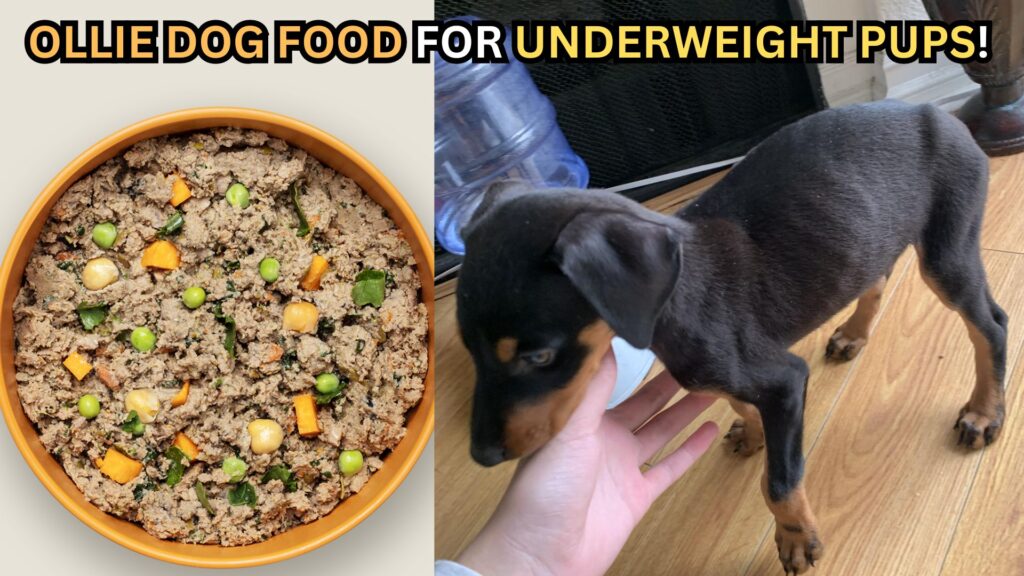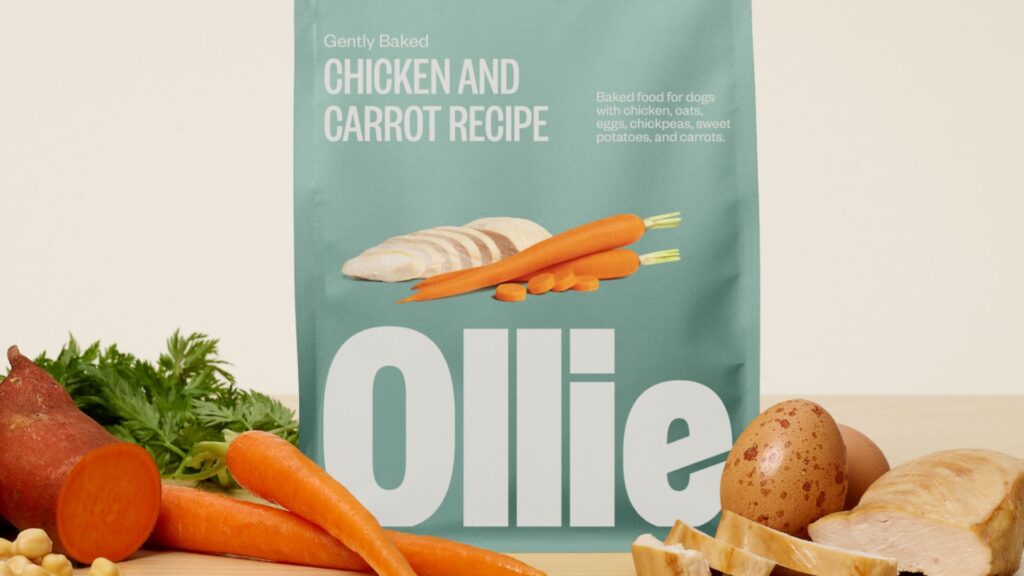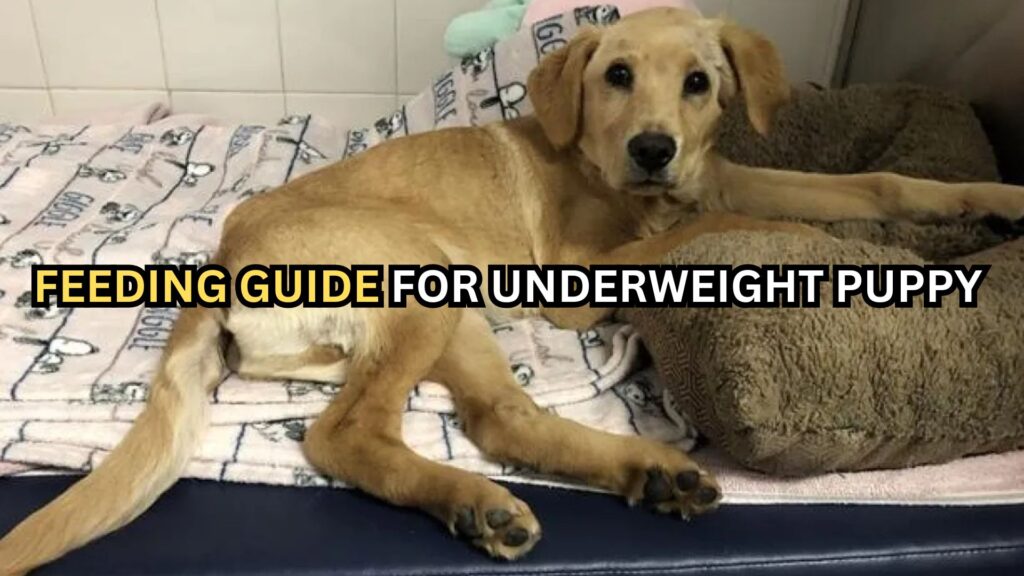Introduction
The well-being of our furry friends is a priority for any pet owner, particularly when it comes to their health and nutrition. Underweight issues in canines can be a sign of underlying health problems or insufficient nutrition, affecting their overall health, energy levels, and quality of life.
In this context, choosing the right dog food becomes a crucial decision for pet parents striving to improve their pups’ health and well-being.
In the pet food market, Ollie dog food has established itself as a notable brand, renowned for its fresh, high-quality ingredients and customized meal plans tailored to each dog’s unique needs.
But how suitable is Ollie dog food for underweight puppies?
This post aims to delve into this question, evaluating Ollie’s nutritional content, consulting expert opinions, and reviewing real user experiences to provide a comprehensive overview for pet owners.

Understanding Canine Undernutrition
Understanding what constitutes an underweight puppy is the first step toward addressing this issue.
Typically, underweight dogs have visible ribs, no discernible body fat, and lack muscle mass.
This condition can lead to various health problems, including weakened immune systems, poor coat quality, and decreased energy levels, which can significantly impact their quality of life.
Causes
Common causes of undernutrition in dogs include;
- inadequate diet
- malabsorption
- parasites
- or underlying medical conditions
It is crucial for pet owners to recognize these signs early and consult a veterinarian to determine the cause and best course of action.
Addressing underweight issues promptly can prevent more severe health problems and aid in the recovery and well-being of the puppy.
Overview of Ollie Dog Food

Ollie dog food was founded with the mission to provide dogs with the highest quality of nutrition, resembling a home-cooked, well-balanced diet.
This commitment to pet health is evident in their use of whole, human-grade ingredients, devoid of fillers, by-products, or artificial flavors that are commonly found in traditional dog foods.
Ollie offers a range of recipes designed to cater to different dietary needs and preferences, including beef, chicken, turkey, and lamb.
Each recipe is formulated with key ingredients to provide a balanced diet, rich in proteins, carbohydrates, fats, and essential vitamins and minerals.
This ensures that every meal is not only delicious but also nutritionally complete.
Customization
One of the standout features of Ollie dog food is its customization process.
Upon signing up, pet owners provide detailed information about their dog’s breed, age, weight, activity level, and any health issues, including being underweight.
Ollie then uses this information to create a personalized meal plan tailored to meet the specific caloric and nutritional needs of the dog, ensuring they receive the right amount of food to achieve a healthy weight.
Nutritional Analysis for Underweight Pups

When addressing the dietary needs of underweight pups, it’s crucial to focus on high-quality, nutrient-dense foods that promote healthy weight gain and overall wellness.
Ollie dog food meets these requirements through its high protein content, essential fats, and balanced carbohydrates, ensuring that each meal supports a puppy’s growth and energy levels.
Each Ollie recipe is designed with a specific nutritional profile that supports various health needs, including those of underweight dogs.
For example, their meals typically contain a balanced mix of lean meats, vegetables, fruits, and healthy fats, providing a comprehensive array of vitamins, minerals, and amino acids.
This ensures that underweight puppies not only gain weight but do so in a healthy and balanced manner.
Nutritional Requirements
Comparatively, the nutritional requirements for underweight puppies, as recommended by veterinarians, include increased caloric intake and a higher percentage of protein and fat to support their growth and energy levels.
Ollie’s personalized meal plans take these factors into account, tailoring the food quantities and ingredients to meet the heightened nutritional needs of underweight canines.
Many veterinarians and canine nutritionists endorse fresh, high-quality diets like Ollie’s for underweight puppies due to their high digestibility and nutritional value.
The fresh ingredients used in Ollie meals ensure that dogs are receiving the most bioavailable nutrients to aid in their weight gain and overall health improvements.
Feeding Guide for Underweight Puppies

Properly feeding an underweight puppy requires careful attention to meal planning and observation.
Here are some guidelines for feeding underweight puppies with Ollie dog food:
- Portion Sizes: Start with the recommended portion size based on the puppy’s target weight, not their current weight. Ollie provides customized portion recommendations to ensure that your pup is receiving the appropriate amount of calories for healthy weight gain.
- Frequency of Meals: Underweight puppies often benefit from more frequent meals. Instead of two larger meals, consider feeding them three to four smaller meals throughout the day. This can help boost their metabolism and provide a constant source of energy.
- Transition Process: If transitioning from another food to Ollie, do so gradually over a week to avoid digestive upset. Start by mixing a small amount of Ollie with their current food and gradually increase the proportion of Ollie while decreasing the old food.
- Monitoring Progress: Keep a regular check on your puppy’s weight and body condition. Look for visible improvements in their energy levels and overall health. Adjust portions and feeding frequency as needed based on their progress and activity level.
Alternatives and Supplementary Measures
While Ollie dog food is an excellent option for many underweight puppies, it’s important to recognize that every dog is different.
Some puppies may require additional high-calorie supplements or alternative high-calorie dog foods to meet their nutritional needs.
Consult with a veterinarian before introducing any new supplements or foods into your puppy’s diet.
In addition to dietary changes, other measures can help underweight puppies gain weight:
- Increased Exercise: Regular, moderate exercise can stimulate appetite and help build muscle mass, contributing to healthy weight gain.
- Regular Health Check-ups: Frequent visits to the vet can ensure that any underlying health issues contributing to underweight are identified and treated promptly.
- Environmental Enrichment: A stress-free environment and regular socialization can improve a puppy’s overall well-being and appetite.
Remember, the journey to a healthy weight is a marathon, not a sprint.
Patience, care, and regular consultation with veterinary professionals will ensure that your underweight puppy reaches a healthy weight and maintains an optimal state of well-being.
FAQs
Is Ollie dog food suitable for all breeds of underweight puppies?
Ollie dog food is formulated to meet the nutritional needs of dogs from various breeds. However, the best approach is personalized, considering each puppy’s unique dietary requirements.
Consultation with a veterinarian can help determine if Ollie is suitable for your specific breed of underweight puppy.
How long does it typically take to see weight gain in underweight puppies after starting Ollie dog food?
The time it takes to see weight gain in underweight puppies after starting Ollie dog food can vary based on several factors, including the puppy’s initial health status, how underweight they are, and their individual metabolism.
Generally, owners might start to see changes within a few weeks, but consistent and healthy weight gain might take longer.
Can Ollie dog food be mixed with other foods or supplements?
Yes, Ollie dog food can be mixed with other foods or supplements if deemed necessary for the puppy’s health and weight gain.
However, it’s essential to do this under the guidance of a veterinarian to ensure that the puppy receives a balanced diet without exceeding their nutritional needs.
What should I do if my puppy doesn’t like Ollie dog food?
If your puppy does not seem interested in Ollie dog food, you can try mixing it with a small amount of their previous food or a palatable topper to make it more appealing.
If the lack of interest persists, consult your veterinarian for advice and possible alternatives.
Are there any side effects of switching to Ollie dog food for an underweight puppy?
As with any dietary change, switching to Ollie dog food may result in temporary digestive issues such as loose stools or an upset stomach.
This is why it’s recommended to transition slowly over a week or more.
However, if side effects persist, consult your veterinarian to rule out any underlying issues or to make further dietary adjustments.
Remember, the journey towards a healthy weight for your underweight puppy should be gradual and monitored closely. By providing them with the right nutrition and care, you can help ensure they grow into a healthy and happy dog.


